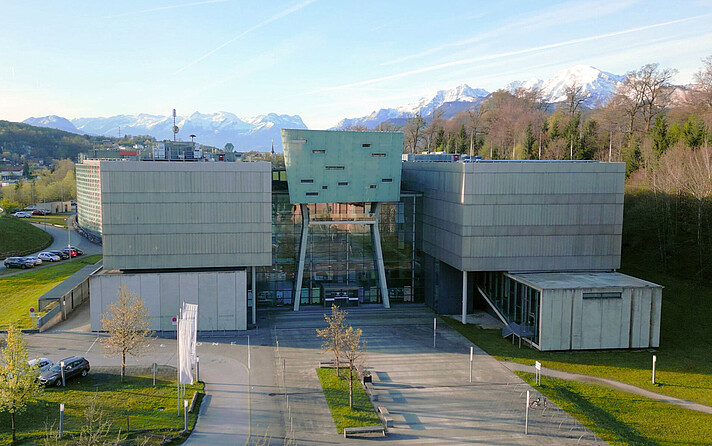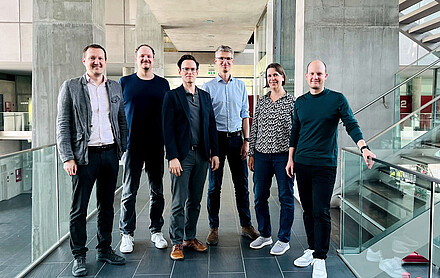With a new strategy for research, technology, and innovation (RTI), Salzburg University of Applied Sciences (FH Salzburg) is laying a solid foundation for top-tier practical research. Interdisciplinary collaboration and internationalisation add value to science, business partners and education. Additional start-up funding from the university’s shareholders will support selected research projects from autumn 2024, strengthening the new research strategy for the long term.

In alignment with the new organisational structure of FH Salzburg, research activities follow the implemented departmental framework. Six key research areas were defined: : Social Innovation, Future Service Industries, Human-Centered Technologies & Design, Applied Health Innovation, Sustainable Materials and Technologies and Industrial Informatics. FH Salzburg seeks to make significant contributions to social, digital and ecological transformation through its research specialisms. This fosters profile building, long-term collaborations and high performance, which enhances international visibility. The current research budget will be increased by at least 25 per cent over the next three years, with new flagship projects, such as additional Ressel Centres, in the pipeline. New projects are evaluated for their contributions to the 17 Sustainable Development Goals (SDGs) or their alignment with the knowledge strategy of the province of Salzburg, focusing on life sciences, digital solutions, smart tourism, Tech4Green or creative industries.
New “trampoline” start-up funding
In addition to dedicated researchers and exciting research topics, reliable partners are crucial for conducting research at universities of applied sciences. The province of Salzburg, the Salzburg Chamber of Commerce and the Salzburg Chamber of Labour – the university’s three shareholders – have agreed to new start-up funding to strengthen the research site in spring 2024. The pilot phase of the new “trampoline” funding will begin in autumn 2024, with the six departments receiving an extra 100,000 euros for their research projects. This additional funding acts as a form of base funding, enabling short-term initiatives that have yet to secure third-party funding or are in transitional phases. It will also support projects aimed at strengthening specific key research areas. The goal is to build trust, offer long-term career prospects to research staff and create a leverage effect for future applications. Research projects will receive funding based on several key criteria: In addition to the research focus addressed, relevance to research-related teaching and the degree of interdisciplinarity are taken into consideration as well, for instance.
„In recent years, we have built a stellar reputation for excellent research with high practical relevance. With a research budget of around 5 million euros per year, FH Salzburg has performed admirably well in a competitive environment. The new RTI strategy and additional ‘trampoline’ start-up funding will ensure this continues. A trampoline provides momentum and cushions setbacks, which is precisely what we aim to achieve with the additional funding,” emphasises Rector Dominik Engel.
We'd like to point out that after activation data may be sent to third parties. Further information can be found in our
privacy statement.
Statements of the shareholder
Dr. Wilfried Haslauer, Governor of the State of Salzburg: "Financial and structural investments in research and development are proverbially investments in the future. In recent years, the state of Salzburg has significantly gained ground in research spending compared to other states. However, there is still much to be done to position Salzburg as a powerful, innovative, and competitive research location for the future. Providing the best possible support for the invaluable daily work conducted in our local research institutions is a key contribution towards achieving this goal. The Salzburg state government has committed to this pursuit with its Science and Innovation Strategy Salzburg 2030 (WISS 2030), which is part of the Salzburg 2035 Location Strategy."
Manfred Pammer, Director or the Chamber of Commerce Salzburg: "An investment in research and development is an investment in the economic growth of tomorrow. Companies must continually develop their products and services to remain competitive in the market. Therefore, a diverse research landscape that maintains a good exchange with and supports the economy is a crucial locational factor. Applied research, in particular, significantly contributes to the innovative strength and continuous renewal of an economic region. Since research and education are closely linked, a high-performing research institution like the Salzburg University of Applied Sciences is also an indispensable talent factory for the key personnel of tomorrow, which the economy urgently needs. All these aspects and considerations ultimately led to the founding of the Salzburg University of Applied Sciences in 1995, in which the Salzburg Chamber of Commerce played a significant role, and they remain important guidelines for the future development of this research institution, which is so important for the location, even in a changed shareholder structure."
Cornelia Schmidjell, Director of the Chamber of Labour Salzburg: "With first-class professional education and research, the Salzburg University of Applied Sciences combines everything needed for a modern knowledge society and a future-ready job market. Investments in research and innovation pay off doubly: they secure and create jobs and help to address future societal challenges such as digital transformation and social sustainability. Moreover, the University of Applied Sciences is the best-practice example of what is possible when politics and interest groups work together. The 'Trampoline' project serves as a proverbial springboard to further expand research. We, the Salzburg Chamber of Labour, are proud to be a co-sponsor and part of this impressive success story."
Practice-informed research – relevant findings for teaching and professional practice

Ultimately, it is crucial that research results can be quickly and easily applied in practice through company collaborations and their integration into students’ education. This ensures that current research findings receive practical relevance through graduates. Many topics researched by the university’s teams originate directly from companies seeking solutions to practical challenges. The frequent emergence of successful start-ups by graduates shows how important practice-oriented, cutting-edge research-driven teaching is.
Promoting talent and interdisciplinarity
To attract researchers, FH Salzburg has defined measures within its RTI strategy to promote talent and facilitate career progression. A clear career path from Junior Researcher to Senior Researcher has been established. Key focus areas include increasing the number of habilitated researchers and promoting women in research. Salzburg University of Applied Sciences has a long-standing tradition of interdisciplinary collaboration on projects, which will be further strengthened by the RTI strategy. For instance, forest product technologists collaborate with health scientists and information technology experts. Such diverse perspectives encourage lateral thinking and yield exciting results and solutions.
„warum! (why!)– The Magazine of FH Salzburg“: ePaper offers insights into research and teaching
Many examples that reinforce the new research structure can be found in the current issue of the ‘warum!’ magazine of the Salzburg University of Applied Sciences. The ePaper presents current research projects, as well as projects with corporate partners and innovative work by students.